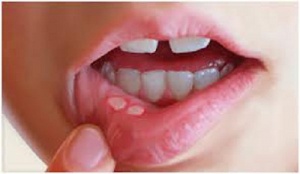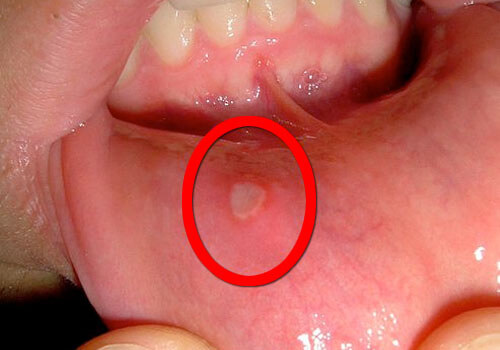Treat and Prevent Canker Sores

Canker sores are a type of ulcer or open sore in the mouth, and can be very painful. They may be white or yellow, and usually are surrounded by a bright red area inside the mouth. They can appear because of viral infections, but in some cases it’s impossible to know the exact cause. Read on to discover how you can treat and prevent canker sores.
These ulcers may be linked to problems with the body’s immune system. They often appear after an injury to the mouth, dental work, or an accidental bite to the cheek or tongue.
Why do canker sores appear?
- Emotional stress
- Lack of vitamins and minerals in our diet, such as iron, folic acid, or vitamin B12.
- Hormonal changes
- Menstrual period.
Anyone can suffer from canker sores, although they’re more commonly seen in women and in certain cases can be hereditary.
The symptoms are:
- A red, painful spot that later becomes an ulcer
- The ulcer becoming yellowish in color
- Discomfort and sometimes fever
Pain caused by canker sores can last between 7 to 10 days, even up to about 3 weeks, depending on the size of the ulcer.
How to prevent canker sores?

- Vitamin B2. A deficiency of this vitamin produces cracks in the corners of the mouth and skin. We find it in bread, whole grains, green leafy vegetables, and milk.
- Vitamin B3. Eating this vitamin helps us prevent oral diseases as well. We find it in red and white meats, milk, dairy, and eggs, for example.
- Folic acid. Mouth sores can occur when we are low in folic acid, and also when we have anemia. However, ingesting folic acid in high doses can be harmful, so consult your doctor.
- Vitamin B12. To get the required amount of this vitamin, experts recommend the consumption of animal products like seafood, meat, and dairy.
- Vitamin C. A deficiency of this vitamin won’t cause sores of the mouth, but can lead to bleeding gums. Foods that are rich in vitamin C are citrus fruits and other types of fruits and vegetables.
There are also two types of foods that can help to prevent canker sores. One group is probiotics and the other group includes foods that contain Omega 3. Both have anti-inflammatory effects, and in addition, a study at the University of Kentucky showed they have antibacterial potential.
Foods containing natural probiotics are fresh yogurt and fermented milk products. Foods rich in Omega 3 include fish, sunflower oil, and nuts.
Read more: 6 Ways to Use Natural Yogurt in Homemade Remedies
Remember…
If your daily diet is poor in nutrients, it’s likely that you will get mouth sores, so it’s important to discuss some ways to alleviate the pain or discomfort that they cause.
Although the American Dental Association says that in most cases these sores go away by themselves, there are options to speed up the healing process and relieve the symptoms.
- Certain types of mouthwash for canker sores are available in stores, but experts recommend the milder ones.
- Use a homemade mouth rinse that’s easy to make with water mixed with salt, or baking soda.
- Another option is to mix water with hydrogen peroxide and apply it directly to the sore with a cotton ball.
All these things can be done as often as needed to promote faster healing.
All cited sources were thoroughly reviewed by our team to ensure their quality, reliability, currency, and validity. The bibliography of this article was considered reliable and of academic or scientific accuracy.
- LAWRENCE C. SCHNEIDER AND ADINA E. SCHNEIDER. (1998). Diagnosis of Oral Ulcers. The Mount Sinai Journal of Medicine, New York.
- Nolan, A., McIntosh, W. B., Allam, B. F., & Lamey, P. ‐J. (1991). Recurrent aphthous ulceration: vitamin B1, B2 and B6 status and response to replacement therapy. Journal of Oral Pathology & Medicine. https://doi.org/10.1111/j.1600-0714.1991.tb00950.x
This text is provided for informational purposes only and does not replace consultation with a professional. If in doubt, consult your specialist.








